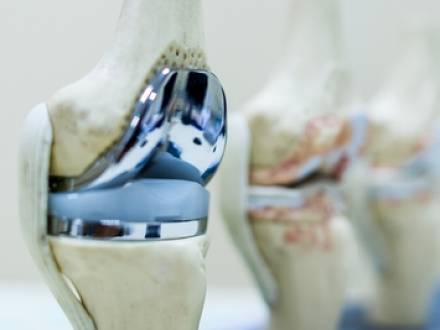Can I Sue if My Doctor Messed Up My Hip or Knee Replacement?
 Sudden injuries, arthritis, and normal wear and tear through usage as we age can damage knees and hips. Since the 1960s, joint replacement surgeries have become increasingly successful and widespread. Recent figures from the American College of Rheumatology show that approximately 544,000 hip replacements and 790,000 total knee replacements are performed annually in the U.S. Orthopedic surgeons typically perform these surgeries, with education and training usually taking 13-14 years.
Sudden injuries, arthritis, and normal wear and tear through usage as we age can damage knees and hips. Since the 1960s, joint replacement surgeries have become increasingly successful and widespread. Recent figures from the American College of Rheumatology show that approximately 544,000 hip replacements and 790,000 total knee replacements are performed annually in the U.S. Orthopedic surgeons typically perform these surgeries, with education and training usually taking 13-14 years.
With that much extensive training, you expect that your surgeon will not make mistakes. However, medical negligence is all too common, even among orthopedic surgeons. Hip and knee replacement medical malpractice cases are some of the most frequently pursued. If you were harmed by a botched knee or hip replacement surgery, or if these surgeries claimed the life of a loved one, our skilled Winnebago County, IL medical malpractice attorneys can help you collect the compensation you deserve.
What Are Some of the Most Serious Consequences of a Botched Joint Replacement Surgery?
When other treatments fail to relieve a patient’s symptoms, joint replacement surgery may be needed. Artificial knee and hip implants are made from plastic and metal. These procedures are intended to improve mobility and range of motion, decrease pain, restore the ability to perform everyday tasks, and enhance the patient’s quality of life.
After the surgery and a recovery period that includes physical therapy, many patients see positive results. Sadly, a botched surgery due to medical negligence can make the existing condition worse or cause new complications.
Transected Nerves
Nerve transection, which is cutting or severing nerves, can be partial or complete. Along with other issues, nerve damage that occurs during surgery can cause paralysis. The symptoms depend on which kind of nerve is cut. For example, sensory nerves control feeling, while motor nerves control movement.
A hip replacement could damage the sciatic or femoral nerves. Knee replacements are more likely to damage the saphenous and common peroneal nerves. When those nerves are cut or otherwise damaged, tingling, numbness, weakness, drop foot, and pain in the leg are common adverse effects.
Limb Loss
Some surgical errors from hip or knee replacement procedures can lead to patients losing their limbs. Damaging major blood vessels, such as the femoral artery, can lead to tissue damage and eventually an amputation. Conditions like fractures caused by the surgical procedure, improper device placement, severe infections, and nerve damage may also require amputations.
Complete Loss of Function
Walking, running, and other motions depend upon properly functioning hips and knees. Patients can lose the function of the affected joint due to nerve damage, improper placement of the artificial joint, infections, or other causes. A poor range of motion and limited weight-bearing ability, for example, can severely limit the patient’s capabilities.
Deep Vein Thrombosis
Hip and knee replacements can lead to deep vein thrombosis, which is a blood clot that forms in the leg. If clots break free and travel to the heart, death can occur. Although surgical errors do not typically cause DVT, it is a known risk in both types of surgery. Failing to take the proper precautions, closely monitor the patient, and promptly address a DVT can be life-threatening or fatal.
Wrong-Side Surgery
As difficult as it is to believe, joint replacement surgeries can be performed on the wrong side. Wrong-site surgeries are considered never events, or those that should never happen. If a surgeon replaces the wrong joint, the problems are twofold. First, the original condition that indicated surgery remains unaddressed. Secondly, the patient must endure significant pain, expense, and the potential for adverse effects from the surgery that was performed.
Suppose the wrong knee was replaced, and the femoral artery and nerves were damaged during the surgery. The patient may lose that leg, which was the "good" one. If the knee surgery is performed later on the correct leg and the patient experiences adverse effects, he or she could be left without either leg.

Why Do These Surgical Errors Happen?
Medical negligence, which is a failure to provide the expected high standard of care that another similarly qualified medical professional would have provided, can take many forms. Common kinds of medical negligence include improper patient monitoring, misdiagnosis, and medication errors.
Surgical mistakes can happen for a variety of reasons, which include:
- An impaired surgeon: Surgery is a delicate business, and doctors need to be well-rested and free of the effects of alcohol and drugs. Impairments mean the surgeon should not perform the procedure because there is a high likelihood of harming the patient.
- Distractions: Unnecessary talking and other distractions in the operating room can cause the surgeon to make careless errors, such as making an imprecise incision.
- Miscommunications: Your surgeon is not the only medical provider in the operating room. The entire surgical team needs to be focused and keep each other informed. Not relaying important information about the patient or procedure, or relaying the wrong information, can lead to harmful mistakes.
- Inadequate planning: Joint replacement surgeries are major operations. A great deal of preparation should take place before the surgery. Failing to plan properly, which includes evaluating the patient’s overall condition and known allergies to medications and anesthetics, can result in unnecessary harm to the patient.
- Failing to follow protocols: There are many safety and hygiene protocols that your surgical team is expected to follow. These protocols are designed to minimize patient risks. Deviating from them can lead to careless errors and patient injuries.
- Surgeon burnout: Like anyone, a surgeon can get tired of performing the same type of operation regularly. Burnout can lead to carelessness, disinterest, and an overall lowering of care standards that endanger patients.
Your surgeon is not the only one who could have contributed to your botched knee or hip replacement surgery. Nurses, the anesthesiologist, and even the hospital could share the liability. Sometimes, another staff member may have reason to believe that a surgeon is likely to make avoidable errors, but is afraid to report it. Whatever the reason for the medical negligence, if it caused harm, you deserve compensation.
How Can a Lawyer Help After a Hip or Knee Replacement Gone Wrong?
Medical malpractice cases include complex medical concepts. You need to prove that the provider(s) were negligent, that the negligence directly caused harm, and that the harm caused you to suffer specific losses. Damages resulting from this negligence could include lost wages, medical expenses, and the various adverse effects on your quality of life.
If the surgical mistake caused a permanent disability, amputation, or another long-term condition, you may also qualify for future expenses and intangible losses. Wrongful death claims can address additional losses that the deceased’s immediate family suffers.
Medical malpractice cases require a professional investigation, expert witnesses to prove that the provider deviated from accepted standards of care, and the severity of the impacts the botched surgery had on your life. You also need to be able to calculate and justify the financial damages you are seeking. The medical malpractice insurer will not let go of a significant sum without a fight.
Our experienced lawyers have the resources and know-how to handle every aspect of your case meticulously. We are aggressive when it comes to fighting for maximum compensation for our clients, as proven by our many victories.
Call Our Determined Rockford, IL Surgical Errors Attorneys
You will not find a fiercer advocate or one who is more committed to achieving the best possible outcome for your case than one of our dedicated Winnebago County, IL medical malpractice lawyers. Contact Mannarino & Brasfield, A Division of Schwartz Jambois online or at 815-215-7561 today to schedule your free consultation.



